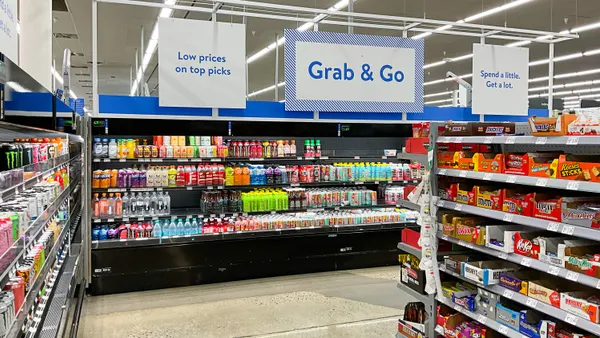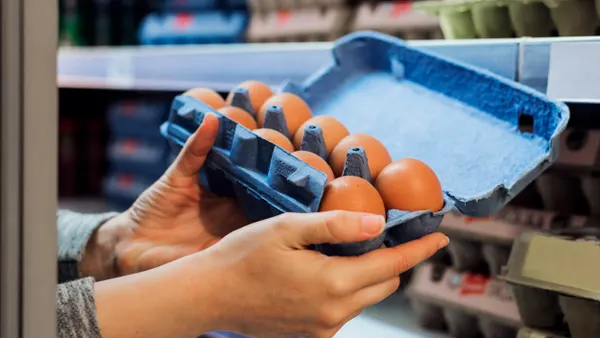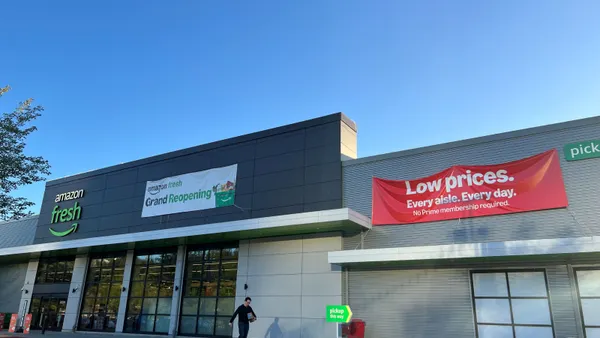Dive Brief:
-
Taking advantage of the Farm Bill’s full legalization of hemp production, Fairway introduced a private label line of capsules, oils, lotions and balms with cannabidiol last week, intended to “provide all-natural solutions for a healthier, less chemical-dependent life,” reported Winsight Grocery Business. Essential Wellness products, infused with 250 to 500 milligrams of CBD, cost $45.99 to $59.99 and will be labeled as “hemp balm” or “hemp oil.”
-
“I think what's exciting about it is that it's now something that grocery retail can really get behind, not just in the wellness sets with vitamins and supplements, but it's also in the drink cooler,” Jason Bidart, the store's vice president of private brand programs, told the publication. Fairway has been selling other brands’ CBD products for two years.
-
In Colorado, where recreational marijuana has been legal since 2014, Alfalfa's launched a “New Relaxed You” campaign promoting its selection of more than 100 CBD and hemp-based products. In addition to lotions and tinctures, Alfafa’s also carries CBD chocolates, cookies, coffee and dog treats, according to WGB.
Dive Insight:
CBD has taken the health and wellness sphere by storm, but it has hit many roadblocks in the past few years because of contradictions among local, state and federal regulations. That discrepancy likely deterred major retailers from jumping into the market too soon, as Natural Products Insider reported in 2017. Retailers, including Fairway and Alfafa’s, had been waiting patiently for legislation included in the 2018 Farm Bill, which legalized industrial and state-regulated production of hemp, and took the crop's derivatives off of the FDA's controlled substance list. (The 2014 Farm Bill permitted hemp production only through state or university-supported programs.)
The market for CBD products is definitely there — in food, too. In 2016, Hemp Business Journal estimated that the hemp industry will grow to $450 million by 2020 with CBD sales to surpass $2 billion. Their analysis culled sales data from seven consumer channels — including dispensaries and smoke shops, as well as natural and specialty retail and mass market providers.
As it stands, the CBD market remains confusing for both retailers and consumers. Prices fluctuate between $0.05 per milligram to $0.60 per milligram of CBD content, according to a price comparison investigation by Leafly. Because of the contradictory regulations, consumers also battle misleading labeling and potentially fraudulent products that cost more than they should. Retailers selling CBD products likely seek to attract consumers with disposable income intent on pursuing trendy health and wellness products that fit natural, additive-free lifestyles.
Fairway explained to Winsight Grocery Business that its CBD line features “full spectrum CBD” that includes other allegedly beneficial compounds of the hemp plant, such as CBN, CBC and CBG. Other products, the retailer claims, contain one isolated CBD compound. However, lack of research and regulations make those benefits difficult to prove.
The FDA has been particularly vigilant in curbing manufacturers from misrepresenting CBD products as dietary supplements, for instance, while Facebook — a major form of advertising for up-and-coming CBD companies — has likewise cracked down on dubious claims online. Just last week, the social media giant disabled Kentucky’s Rocky Ridge Hemp Company profile for violating Facebook’s prescription drug regulations.
Soon after the Farm Bill was signed, FDA Commissioner Scott Gottlieb issued a statement planning to host meetings to discuss potential regulatory pathways for hemp and cannabis compounds in foods. Currently, though the substance is legal, it cannot cross state lines, and it can only be sold in conventional foods or dietary supplements in states and municipalities that have specifically approved it. Due to the ongoing government shutdown, these meetings have not yet been scheduled.
Much of the confusion stems from CBD’s origins, which can be derived from the cannabis plant and from hemp. Whereas hemp-derived CBD is not psychoactive, CBD from cannabis contains trace amounts of THC but must fall under 0.3% in the U.S.
Though large retailers might have strayed from the gray area of CBD until now, smaller, natural-focused shops have been selling CBD products for a few years. However, they don’t come cheap. As regulations are hammered out and CBD becomes a more regular ingredient, consumers may expect to see prices all over the map for these functional products.












